Monday mailbag! (July 2021 edition)
What shows should have been Emmy-nominated this year? And which monster should Emily marry?
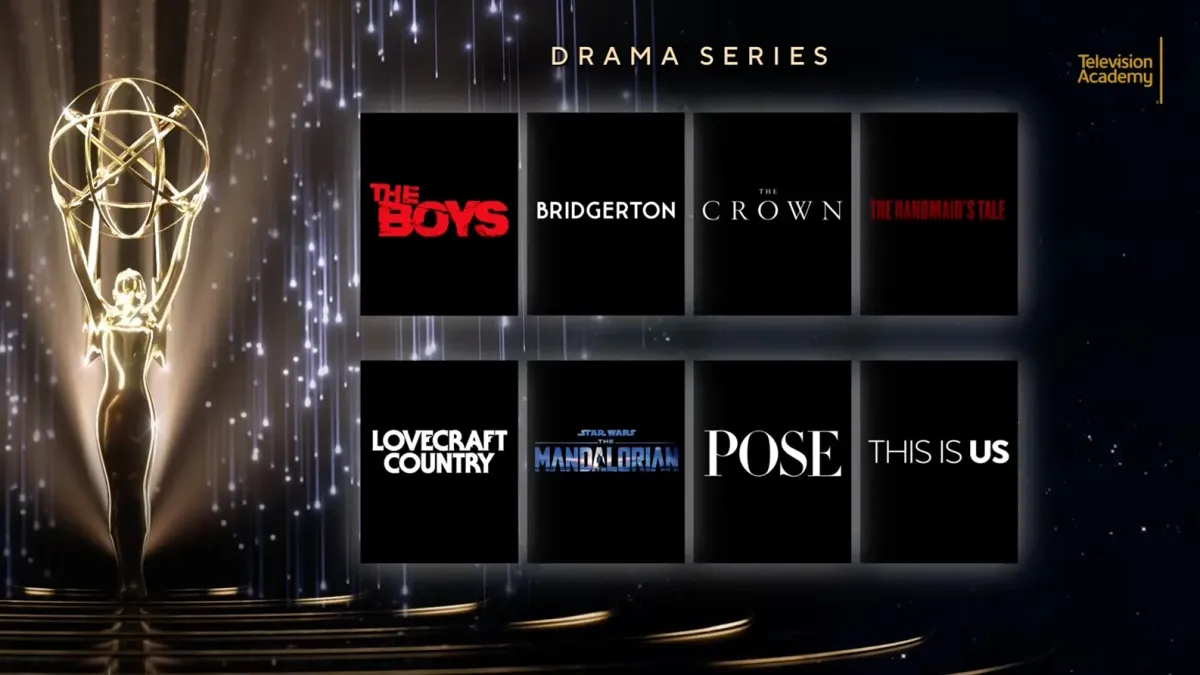
Welcome to the Monday Mailbag, published the third Monday of every month! It's July 2021, and y'all want to know about the Emmys, the monsters I would date and/or marry, and if working on Arden has affected my critical thought processes.
Devin asks:
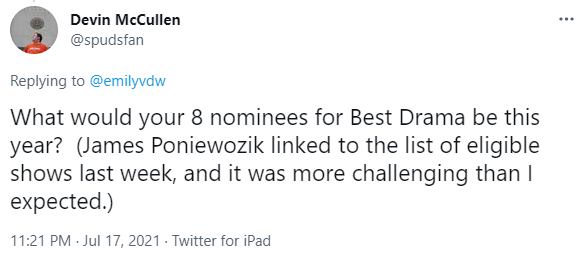
Many of my nominees were Drama Series nominees at the actual Emmys. Like The Crown season four was quite good, and I dug Handmaid's Tale, and The Boys is so compelling, and etc., etc., etc. (The other nominees, by the way, were Bridgerton, Lovecraft Country, The Mandalorian, Pose, and This Is Us.)
I actually think that list is pretty good for what's on TV right now. The real issue is that TV drama is just in a major slump, because so much of the talent that would normally be devoted to it has been drawn to Limited Series. But in thinking about Devin's question, I realized I could still find 10 drama series on TV I liked more than at least one of the eight current nominees and at least two I like more than all eight.
Allow me to show my work:
- All Creatures Great and Small (PBS): This is a terrifically warm and charming little British series that I probably would have had on my ballot.
- The Expanse (Prime Video): Season five was the best season yet for the veteran sci-fi drama.
- For All Mankind (AppleTV+): This is getting my vote for the best drama series of the TV season at the TCA Awards. It should have been nominated.
- Ginny & Georgia (Netflix): Look, I know that this show got canceled (in the "people objected to its content" sense, not in the "won't be returning" sense, because it was renewed), but I really enjoyed it. Should it have been nominated? Nah. Was it better than This Is Us? I think so.
- Good Trouble (Freeform): This continues to be one of my favorite little TV treats. YA TV done really well.
- Grey's Anatomy (ABC): Look, don't laugh. The latest season of the show was really fucking compelling! And if nothing else, it gets points for its handling of the Covid-19 pandemic, which was simultaneously completely bugnuts and surprisingly realistic.
- In Treatment (HBO): Not as good as the show was in its prime, but it really nailed some of its storylines. I probably liked this more than a couple of the actual nominees, at least.
- P-Valley (Starz): This strip-club-set drama is one of TV's hidden gems. I adore this show and like it more than all eight drama series nominees.
- Snowfall (FX): Quietly over the past few seasons, Snowfall turned into a really solid crime drama with some big Game of Thrones energy (I'm not kidding!). In a weak year like this, why not nominate it?
- Superman & Lois (The CW): I kinda hate the CW superhero shows, but I like this one, which is very meat and potatoes and kind of, like, "What if Superman and Lois Lane went to marriage counseling?" Needless to say, that's extremely my shit.
And in the process of making this list, I cut another four or five shows. I don't think these series stand with the best in TV history or anything, but I find all of them shows I really love watching. And series like For All Mankind really do strike me as some of the best of what TV has to offer right now.
NicolasCageAgainsttheMachine asks:
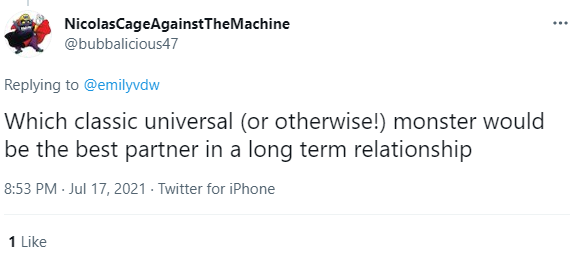
The obvious answer is the Creature from the Black Lagoon. He has a pretty sweet place in a desirable location, he doesn't have much to say, and he seems very protective of whomever he loves. Yes, there's the whole "stalks you from beneath" thing, but whomst amongst us, etc., etc., etc.
If I can include kaiju, however, then I would marry Godzilla, a beautiful boy who would hold me in his tiny hands as he stomped all over the world.
Finally, please introduce me to Lord Summerisle from The Wicker Man immediately! I feel like he and I would really have some cool things in common, like our desire to construct societies built around burning gigantic wicker men, our love of rural ways of life, and our hatred of outsiders who believe they can track down mysterious missing women on our shores. Lord Summerisle: I am a comely lass, and I'm totally fine with being in a polycule.
Grace asks:
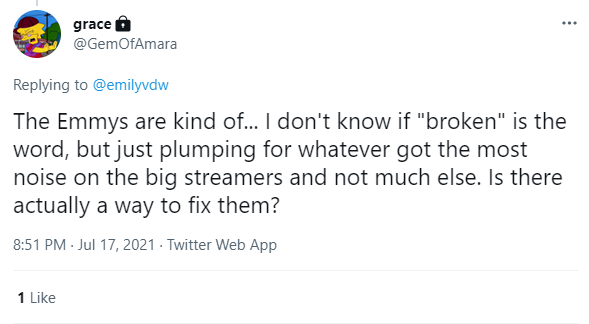
Short answer: no.
Long answer: yes, but it will probably introduce all sorts of new problems.
So the current Emmy voting system is the end result of a whole bunch of other voting systems that mostly resulted in disappointing nominations, because the people who vote for the Emmys often don't have time to watch too much TV. In particular, the current Emmy system ditched an old format where voters only voted in certain categories at the winner stage. Now everybody votes for major categories, which is why there were those years where Game of Thrones just swept everything.
The system that I think the Emmys could potentially look toward is the one for the Grammys, wherein the entire voting body votes, then a small committee of people listens to the top 20 vote getters in the major categories and produces a list of eight nominees from that list. (In smaller categories, there are other procedures that might also map onto other Emmy lower-ballot categories, but we don't care about those.)
But the Grammys have come under fire in recent years for their relative paucity of diversity, especially in their winners. When a hip-hop album hasn't won Album of the Year since Outkast back in 2004, that's probably indicative of a deeper issue within the membership and the various processes. It is really easy to see a jury system like this making the Emmy nominees much, much whiter, almost immediately.
I do think that probably the way forward involves a jury system of some sort, but that system will likely need to have some checks on it. I don't think The Mandalorian is one of TV's best drama series, but it's clear lots of people do. As such, I think it's probably fine that it's nominated for the Emmy. A jury system needs to account for both those poles of thought, especially if it wants to reflect some vague notion of the scope of what constitutes "good TV."
(A change I'd make immediately would be to keep the eight nominees system but limit TV Academy voters to only five votes in the series categories. It might result in some truly wacky shit, but truly wacky shit is preferable to what we had this year.)
I don't know. I thought the list this year was fine. I wish Underground Railroad had done a lot better and that For All Mankind and Good Lord Bird had been recognized at all. I think some sort of jury system will help with that in the end. But at the end of the day, there is just too much fucking television for the Emmys to ever make sense of it. The best they can do is throw a dart at what seems good and hope they hit something worthwhile.
Via email, Katie asks:
In The Discourse, it's become somewhat common to respond to comments about the prevalence of IP and franchises these days with examples of franchise-driven movies from the past (ie Broadway adaptations, the massive number of Blondie movies, et). Is our current era really of a piece with the past (simply subbing in superheroes for Westerns and whatnot) or is there something meaningfully different with how things work now?
Short answer: No. Hollywood has always been driven by crude commercial calculations that lead to bleeding certain genres and intellectual properties dry.
Long answer: Oh my God, yes.
So it's true that, say, Universal made monster movie after monster movie back in the '30s and '40s because those movies made money. And it had those monsters link up into a larger cinematic universe in a very Marvel fashion. But at the same time, Universal was making a bunch of other movies. In 1941, for instance, Universal made The Wolf Man, but it also made 57 other movies. And those are just the movies listed on this website I found. Most of them are trash. Indeed, The Wolf Man is probably better than most of them. But the studio was making all sorts of different things.
As a comparison, in 2019, Disney released 16 movies, and several of those movies were acquisitions from 20th Century Fox in the deal that merged the two studios. Of those films, 10 were franchise sequels or remakes, including two Marvel movies. Arguably the only original movie that Disney itself released was... the documentary Penguins.
And, like, we don't have to go back to the 1940s for this to be true! In 2012, for instance, the year of the first Avengers, Disney released only 13 films, but outside of The Avengers, they were all original movies and not just attempts to mine intellectual property. And The Avengers is a fun movie too!
I'm not trying to say superhero movies have broken Hollywood. I'm trying to say that they have sucked up so much of the oxygen and money other genres need to get by that they've permanently warped how we think about what movies are. Whole genres have been relegated to the dreaded limited series format, and while, say, horror movies quietly soldier on, it's so much harder to find a good romantic comedy. Superhero movies aren't the enemy, but they are a canary gone quiet in a coal mine.
Finally, Tobias asks:
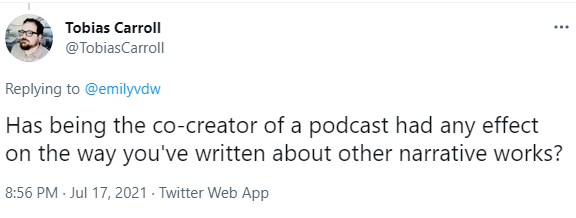
There are two ways I can answer this question: the critic way and the creative way. I'm going to start with the critic way.
I have talked in a few places about how making Arden (an award-winning podcast that is simply one of the very best around) made me slightly more gun shy about being too vicious in my day job. (It's also made it harder for me to review things that, say, star Zach Grenier, an actor who is in a lot of things including my show.) The reason is not that I have stopped seeing when TV shows or movies are bad, because I haven't. The reason is that I'm now always conscious of how much my own emotional reaction colors what I think about the piece. A little of that is good! I'm not sure how much, though.
Here's what I mean: I try not to read Arden reviews anymore, but after season one, we were reviewed rather critically by some audio fiction critics who were unable to get on our hype train. Some of their criticisms struck me as fair, while others struck me as a bit nonsensical. But two criticisms really stuck out to me, simply because they were criticisms driven by deliberate choices that we made as writers.
The first was that the critics didn't understand why, after building a true-crime frame, we had completely ditched that frame for the penultimate episode of the show's first season. If you've listened to season two, you know we were always heading away from the "fake show" facade (and, honestly, by that point in season one, we had mostly left it behind). But suffice to say: The question of why we had done this had occurred to us multiple times in creating the episode. The critics' interrogation of why we did this was fair, but it seemed to stop short of the thought that we had done what we did intentionally.
The second was that the critics didn't like what Bea and Brenda did at the end of season one, which seemed unwilling (to my mind) to engage with the thought that we, as creators, didn't like what they did either. It was another deliberate choice discussed as a serious misstep.
And look: Those critics had that emotional experience of listening to our show. They were being honest, and I'm glad that they were. I still have them on our list for advance episode screeners. Bad reviews or even reviews that you think miss the mark are part of the business.
But I think about that critique a lot when writing my own reviews now. What deliberate choices am I writing off as serious missteps? What am I missing when I don't engage with a creative choice that maybe infuriates me but is still a creative choice? When critics write about good art, we write about it as though the artist is in full command of their toolset. But when we write about bad art, we almost act as if it's a foolish calamity, made by people who don't understand the tools. But what if they're just using the tools in a way we don't immediately get? I don't know. I've been doing this too long.
The "creative" answer is that working on Arden has given me a window into how stories work in different formats. I don't think I could have written my first novel (which I'm revising) without having worked on Arden, simply because working on Arden gave me a great window into why certain stories work in certain formats and don't in others. Arden is a very peculiar beast that could maybe only work as a podcast, and understanding how it is shaped by its medium has made me think about how the other things I write (including the criticism!) are shaped by their media as well.
Though only one of them has a duck-obsessed billionaire. (It's my show, the podcast Arden, available wherever fine podcasts are sold.)
Remember: The third Monday of every month is MAILBAG MONDAY! You can tweet me questions at @emilyvdw or email them to me at episodes.pitches@gmail.com or just post them in the comments of this article. I'll pick another five to answer in August!
Talk back to me: Which shows were passed over by the Emmys that shouldn't have been? Defend your favs in comments or email!
What I've been up to: I have some exciting stuff in the works at Vox, but last week, I published this look at We Keep the Dead Close, one of my favorite true-crime books in a long while.
In some ways, Becky Cooper’s true crime book We Keep the Dead Close gives in to some of the genre’s worst impulses. Cooper spends a ton of time explaining her investigative process in lieu of just telling readers what happened, she includes seemingly irrelevant personal details about her life, she sometimes reduces the central murder victim in her story to a cipher, and she covers a crime that was solved while she was reporting on it — so anyone who gets bored can just look up “the ending” online.
What ultimately makes the book great is that, in Cooper’s case, all of these choices are very much intentional. We Keep the Dead Close is the rare work that functions as both a really strong example of the genre it exists in and a critique of that genre. It’s a true crime book that isn’t sure of anyone’s need for a true crime book.
What you missed if you aren't a paid subscriber to Episodes: Hazem Fahmy took a look at the problem with some of the era's most popular teen shows and found the cure for what ails them in Netflix's Never Have I Ever.
The teen shows of today have a problem: They increasingly seem uninterested in being about the teens onscreen. They either gesture to some essential sense of Gen-Z-ness, or they force a shallow aura of relatability vis-à-vis attempts at “diversity” while still very much being about rich kids.
As has been the case with every new generation of young people, Zoomers are currently being subjected to an endless stream of essentializations and reductive assessments. But these analyses ignore the fact that age, when stripped of other critical identity markers like race and class, says virtually nothing in and of itself about a given person’s beliefs or actions. Being born within a certain range of years has no bearing on one’s material circumstances, their access (or lack thereof) to institutional resources, or their relationship to contemporary popular culture and technology.
Attempts to present a comprehensive narrative that encapsulates an entire generation ultimately normalize a specific kind of upper-class suburban adolescence as the definitive representation of teenagers today. The high schools of today’s shows look more diverse, sure, but they overwhelmingly remain sites of massive, unexamined economic privilege.
And my Avatar recaps got to a hugely exciting two-parter that kicks off the show's end game.
Read me: Friend of the newsletter Libby Hill ran the numbers on this year's Emmy nominations over at Indiewire and realized that just 12 shows account for over 36 percent of the nominations. When there are far more than 12 shows on TV, that's a dispiriting trend!
Those numbers, however, don’t paint the entire picture without knowing approximately how many nominations were distributed each year. Two years ago, there were 649 nominations meted out, giving the top 12 shows a 30.2 percent share. Last year, total nominations numbered 628, with the top 12 taking a 30.7 percent share. But this year, a clear reflection of the ongoing pandemic, overall nominations were reduced to roughly 613 — “Celebrating America – An Inauguration Night Special” appeared on multiple platforms, so its two nominations were not included in the overall count — meaning that the top nominees received a whopping 36.5 percent of all available nominations.
While it’s possible that this jump is entirely due to a lack of submissions and/or more ineligible shows due to the pandemic, it feels probable that this is an issue that won’t be disappearing any time soon.
Watch me: Have I linked to "The History of the Seattle Mariners" before? Well, it rules, and now you can watch all 220 minutes of it in one video, rather than six separate ones. Wow!
And another thing... YouTube periodically surfaces videos of Phoebe Bridgers performing before she was famous, because I clicked on one once, and in the comments of one in particular, her former high school teacher linked to a song she sang with her classmates at LA's arts high school. It's not my favorite song in the world, but it's really fascinating to hear how her voice has changed since then!
This week's opening credits sequence: I have long been fascinated with the short-lived '80s series Open All Night because I'm obsessed with places that are, uh, open all night and also because the theme song rules. Have I actually watched it? No.
A thing I had to look up: A lot of things, honestly! But I really did have to go back and refresh my memory on how the Grammy nominations process works, because it's the closest thing we have to what is frequently proposed for the TV Academy to do.
This week's listening music: "Creep" by mxmtoon
Episodes is published three times per week. Mondays feature my thoughts on assorted topics. Wednesdays offer pop culture thoughts from freelance writers. Fridays are TV recaps written by myself. The Wednesday and Friday editions are only available to subscribers. Suggest topics for future installments via email or on Twitter. Read more of my work at Vox.



